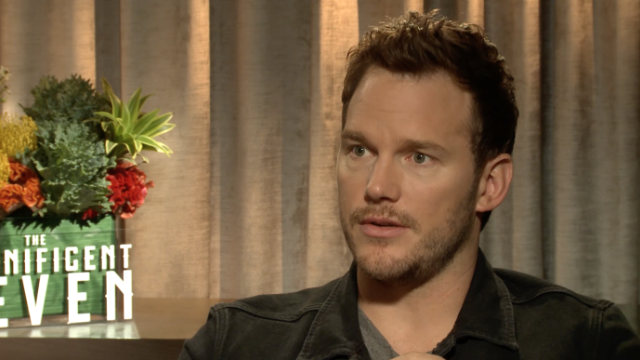The title and outline might be the same, but “The Magnificent Seven” has been put on steroids — blown up and lobotomized for an audience weaned on the “Fast & Furious” movies, not westerns.
Granted, the title has demonstrated itself to be durable. The 1960 classic (itself adapted from “The Seven Samurai”) spawned three sequels, a TV series and even inspired an outer-space knockoff, “Battle Beyond the Stars.”
Still, this new version — directed by Antoine Fuqua, who reunites with his “Training Day” stars Denzel Washington and Ethan Hawke — has made one choice after another that strips the movie of any subtlety, all building toward a climax that ups the carnage to almost absurd levels.
The basic plot still involves a small town of farmers (somewhere called Rose Creek, nowhere near Mexico) enlisting a septet of tough, heavily outnumbered hombres to take on a very bad man (Peter Sarsgaard) and his minions. Only here, the heavy is a mining magnate determined to oust them from the town, creating no option but to flee or fight.
Similarly, the script (by “True Detective’s” Nic Pizzolatto and Richard Wenk) has omitted what motivated the original group to undertake what looked to be a suicide mission — namely, that the age of the gunfighter was coming to an end, meaning they were all living on borrowed time.
Instead, the movie has substituted a half-baked revenge plot for their leader, Sam Chisolm (Washington), who goes about assembling the team and girding for battle against not just 40 bandits, but a veritable army.
As for the recruits, the other headliner is the red-hot Chris Pratt — whose roguish charm is surely one of the movie’s bigger marketing assets — as a boozy gambler, while the rest have been transformed into a rainbow coalition.
Beyond the color-blind casting of Washington, the gang features a Mexican (Manuel Garcia-Rulfo), Asian (Byung-hun Lee) and a bow-slinging Native-American (Martin Sensmeier), as well as Vincent D’Onofrio as a bearded mountain man, who vaguely resembles a homicidal Santa Claus.
That diversity would be more admirable if the casting didn’t feel as calculated as everything else about this exercise — designed to help sell the movie to different demographics and international territories. Because while there’s some playful banter among the characters, their personal stories have been largely obliterated with the exception of Hawke, whose role is a sort-of hybrid of the parts played by Robert Vaughn (the self-doubting killer) and Brad Dexter in the original.
Inevitably, the movie spends a lot of time getting ready for the climactic showdown. But it’s so chaotic and protracted as to lose much of its punch. In addition, the body count rises to a level where it’s hard not to wonder how many casualties would have been required to earn the film an R rating instead of the less restrictive PG-13.
The most puzzling decision, however, comes at the very end, when the filmmakers finally if fleetingly make use of Elmer Bernstein’s rousing 1960 theme, about as recognizable a piece of movie music ever written.
For fans of the original, even a snippet of that score is welcome — if only because it signals that the movie’s over.
“The Magnificent Seven” premieres September 23. It’s rated PG-13.
